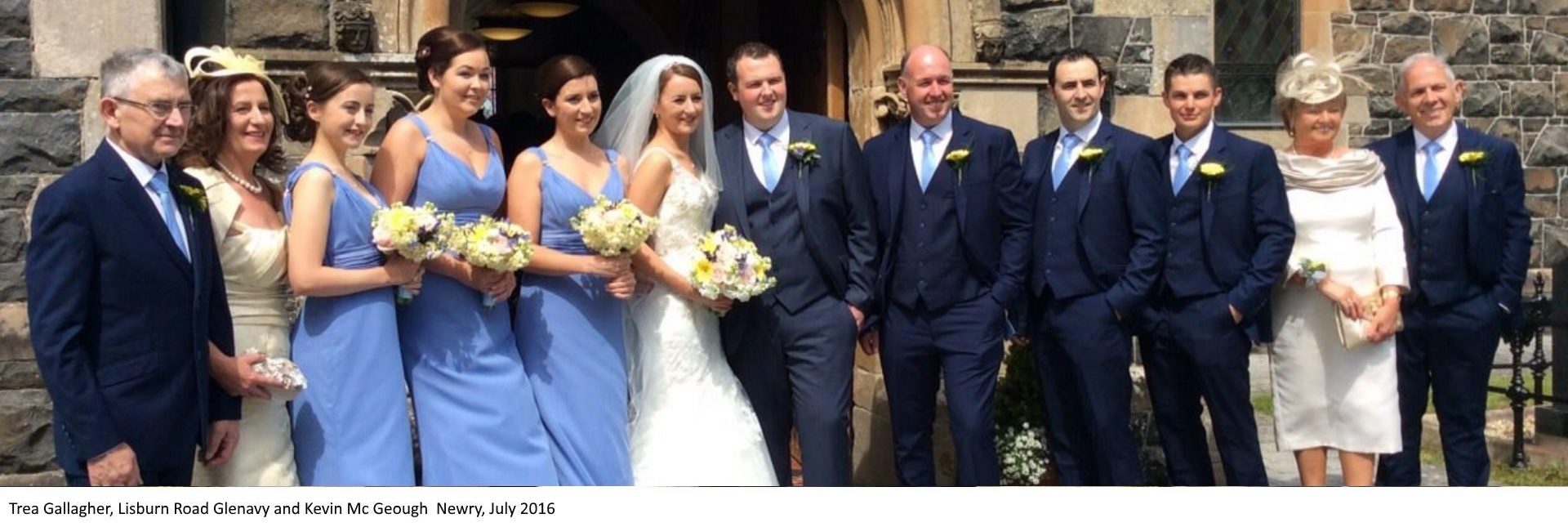
Marriages
Congratulations on your decision to enter the Sacrament of Matrimony.
This is a very special time for you both. Getting married is one of the most important decisions you will make in life. It will be a source of grace and joy but it will also be a life-giving challenge. It will involve focusing not just on one day but also on a lifetime together: who you are, how you relate, what love entails.
In our Church getting married means committing yourselves to each other for life and providing stability for the family with which God may bless you. Listed below are some of the practical things which you will need to do.
Three months notice is the minimum requirement for marrying in Church. To book a wedding please contact the Parish Office.
When you have booked your wedding with the Church then you should book a place on a Pre- Marriage Course run by ACCORD. In our Diocese of Down and Connor courses are held in three different venues. It would be important to book early as these courses are very popular.
- ACCORD Telephone: Belfast: 90339944.
- Ballymena. 38334781 Downpatrick: 44613435
When you have completed your marriage course then make arrangements to meet your priest.
CHURCH DOCUMENTATION:
To marry in the Church you will require the following:
- A Certificate of Baptism from the parish in which you were baptised. It should be a recent certificate (i.e. issued within six months of your wedding).
- A Certificate of Confirmation. When you receive your recently issued Baptism Certificate, check if your confirmation is also recorded on that certificate. If it is, then you do not need an additional Confirmation Certificate: if it is not, you will need a separate Confirmation Certificate from the Parish where you were confirmed.
- The Pre-Nuptial Enquiry Form. This is the principal church document. You should make an appointment with the priest in the parish in which you are living, at least 2-3 months before your wedding, to have the Pre-nuptial enquiry form completed. Bring with you your recently issued Baptism and Confirmation Certificates. The bride has the form completed by the priest of the parish that she lives in, the bridegroom by the priest of the parish that he lives in.
- If you both live in the same parish, you can make an appointment together to see your priest. (It is necessary to have completed your marriage preparation course beforehand). This visit will be a good time to discuss the ceremony. If you wish to contact the priest earlier than this, he will be glad to help.
- For Inter-Church Marriages (i.e. mixed marriages) you both will need to become familiar with inter-Church guidelines for mixed marriages, so contact the priest as soon as possible. The guidelines give advice about where the ceremony could take place, whether or not to celebrate Mass, and whether or not other clergy would be taking part. The priest will be glad to meet you both and answer any questions.
- If you are resident abroad and want to marry in Ireland, give yourself plenty of time to arrange the marriage and complete your preparation. You need to contact both the priest of the parish in which you are presently living and the priest of the parish in which you wish to marry. You may also need to contact the civil authorities (i.e. the local council) to check about civil requirements i.e. a marriage visa for non-European citizens.
CIVIL REGISTRATION
Even through you will marry in church, you have a responsibility to notify the local Civil Registrar of your decision to marry. This will involve completing forms for the registrar and bringing the MARRIAGE SCHEDULE to the church. This is the legal civil document you sign at the end of your marriage ceremony.
Please read the following guidelines carefully.
- You will need to obtain or download a ‘NOTICE OF MARRIAGE’ form, from the local Registrar’s office, preferably 12 weeks before your marriage.
If your wedding is to take place in St Joseph’s Church, Glenavy, contact Lisburn and Castlereagh Council office. If in St James Church, Aldergrove or Mater Dei Church Crumlin contact Antrim and Newtownabbey Council office. - If you or your Fiancée are Non-European Citizens, you will need to apply for a marriage visa in the country of your citizenship
- You should complete the NOTICE OF MARRIAGE forms and arrange for the priest who will officiate at the wedding (the Officiant) to sign the form. The priest must be a registered Officiant (i.e. on the Registrar’s register). If the priest officiating is not serving in Northern Ireland, he may not be a registered Officiant and you should contact your local priest for advice.
- Return the completed forms to the local registrar, along with the fee and any other documents required. Do this approximately 6-8 weeks before the marriage. The official minimum period is 28 days but leaving things so late could result in the postponement of you marriage.
- The local registrar will have the ‘MARRIAGE SCHEDULE’ ready for you to collect 14 days before the marriage. You can collect it when convenient but note, the bride or bridegroom must collect it in person.
- Bring the ‘MARRIAGE SCHEDULE’ to the parish office a few days before the marriage or to the wedding rehearsal. Make sure that you give it to the parish secretary or the priest in person. Please be aware that the priest cannot officiate without receipt of the ‘MARRIAGE SCHEDULE’.
- After the marriage the priest will return the ‘MARRIAGE SCHEDULE’ to you and ask you to sign a receipt. You or your delegate must return the ‘MARRIAGE SCHEDULE ‘to the local registrar within 3 working days.
- Please remember that the legal age of the witnesses, that is the best-man and chief bridesmaid, is eighteen years or over.
Please note that no weddings are celebrated on Sundays, during Lent or on Holy Days of Obligation.
